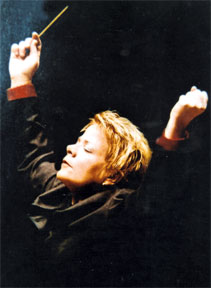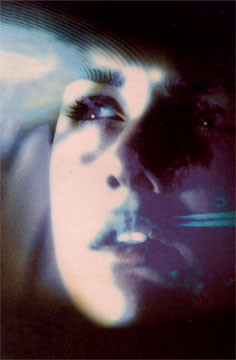|
From the Royal Festival Hall:
The flight of Icarus
by Gwen Herat
Who is he? I never knew either; not until I took my seat at the Royal
Festival Hall to hear the London Philharmonic Orchestra play Icarus at
the edge of time by the world famous conductor, Marin Alsop. I had
nothing else to do that evening and it was too chilly to browse around.
|

The Internationally renowned Conductor
Marin Alsop conducts the London Philharmonic Orchestra in the
ICARUS Symphony at the Royal Festival Hall, London. |
And wasn't I surprised? you bet I was to hear the glorious music of
Philip Glass especially written for the evening as well as for a few
days to follow. I was not comfortable about the set up and it took some
time for me to settle down.
When I turned around and saw the jam-packed R.F.H. auditorium, I knew
I had hit the right spot. They were all a living witnesses to what I
heard and saw. It was unique, unparalleled how a science fiction written
for young adults could capture the imagination to sit upon the
prestigious LPO.
Creating Icarus was a phenomenon that its creator, physicist Brian
Greene achieved. His one idea was to transform it to a love performance,
wither in the theatre or a long medley of delightful sounds to attract
its young readers. He went into the edge-of-the-seat quality along with
some great work of interest in the field of modern-classical music. So,
it was Philip Glass who subsequently emerged in his mind to do the
score. Glass had figured in some of Einstein, Kepler, Galileo and
Stephen Hawking's music on stage but this was different as had the
challenge to face up to the LPO with Marin Alsop with the baton.
But he later said, 'I've always thought that scientists were really
poets and that they were dreamers in the real world' which accounted him
being the choice of Brian Greene. In reality, it was Glass' romantic
music that made Greene feel he was the right composer to bring the
Icarus story to life. With his vast knowledge and experience in music
and film, Glass along with Greene agreed that moving images with
narration and full symphony orchestration would be most compelling as a
story.
Legend
He was also faced with the problem whether the audience was in a
position (like me for example) to digest the maths in this work of art
because the legend is about a 14-year old Icarus who was destined to be
born, live and die on the voyage. Sounds impossible because he is to die
suffering from terrible pain arising from cabin fever. Icarus defies his
father's warning and pleas not to take a ride to the edge of a black
hole, just to prove he can. As stubborn as he was, Icarus fails where
Einstein knew and in the process, he dramatically slows time.
|

The boy who dared to fly close to the sun wearing wax wings
attached to his back. The wax melted and Icarus plunged to earth
and drowned in the sea. He is part of space science. |
This is where Glass' music comes into force and impact the audience
of its significance. It is the moment that Icarus's father see his son
slowing right down whereas in reality, he is ahead in time but the time
has slowed compared to his father's time. It was the mixture of science,
music and gravity all rolled into the LPO's symphonic presentation that
in fact rose over gravity that moment when the audience was mesmerised
into the science fiction that hit the world like hurricane. I was
stunned too by the compelling music played under trying condition.
It is at this point I realised that prose has the luxury of speaking
from a heart from a distance and then roll over to a live theatre to
experience its effect and share with audiences as well as with
performers and create more monologue within ourselves.
Brian Greene is the one who wrote this book and he is one of leading
scientists which was a best seller the moment the book hit the shelves.
He is Professor of Physics and Maths at the Columbia University in New
York. He was responsible in involving part of his work focussed on
getting people excited about science and their mysteries.
With this in mind, he wrote several papers and books for adults and
children about space and the universe. He is reputed for his analys of
work on string theory which is a particular and excing area of physcs
which attempted to reach Einstein's dream of a unified theory of the
universe.
The conductor
Thank God that I was born after Einstein and Darwin because I am
still trying to figure out the basics of Darwin's theory of evolution
that defies God's creation of the universe. I have read his theory over
and over again and is convinced that he was also a creation of God
because I am inspired by the Holy Bible and not by radical scientists
however great they would have been.
The conductor for the evening was the vivacious Marin Also who rates
very high along with the principal conductor, Vladimir Jurowski of the
London Philharmonic Orchestra at The Royal Festival Hall.
She is one of the leading conductors of the world, let alone being a
woman. Alsop created history when she was appointed music director of
the Baltimore Symphonic Orchestra, in 2007. She was the first woman to
head a major American orchestra while she was the principal conductor of
the Bournmouth Symphony from 2002 to 2008 and presently she is Conductor
Emeritus, a great honour for any living conductor.
Other orchestra Alsop is involved with are the Colorado Symphony,
where she is the conductor laureate due to her 12 years as Music
Director. She is also the guest conductor of the New York Philoarmonic,
Philadelphia Orchestra as well as Los Angeles Philharmonic. Among her
many major achievements are a Brit classical for Best Female Artist of
the year, and the Royal Philharmonic Society's Conductor's Award and she
was also honoured by being inducted as a Fellow to the American Academy
of Arts and Science.
The narrator
There is a narrator prelude to Alsop taking over the baton on stage.
He is David Morrissey who narrates the important aspects of the science
fiction. Morrissey has starred alongside David Tenent in 2008 Doctor Who
Christmas and last year's Nowhere Boy, a film about John Lenon.
With Marin Alsop at the helm, the LPO rose high and mighty to
establish its spectacular reputation even further by mixing sounds and
creative bits to give the 'feel' of space.
She was simply brilliant and kept the large audience on this powerful
atomic journey as she sped us through with metallic sounds once in a
while. The meticulous playing drifted through various movements doing
Philip Glass proud of his score of over 45 minutes.
|

